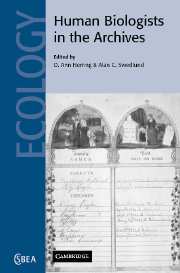 Human Biologists in the Archives
Human Biologists in the Archives Book contents
- Frontmatter
- Contents
- Contributors
- Foreword by Sydel Silverman and Michael A. Little
- Acknowledgements
- 1 Human biologists in the archives: demography, health, nutrition and genetics in historical populations
- 2 The use of archives in the study of microevolution: changing demography and epidemiology in Escazú, Costa Rica
- 3 Anthropometric data and population history
- 4 For everything there is a season: Chumash Indian births, marriages, and deaths at the Alta California missions
- 5 Children of the poor: infant mortality in the Erie County Almshouse during the mid nineteenth century
- 6 Worked to the bone: the biomechanical consequences of ‘labor therapy’ at a nineteenth century asylum
- 7 Monitored growth: anthropometrics and health history records at a private New England middle school, 1935–1960
- 8 Scarlet fever epidemics of the nineteenth century: a case of evolved pathogenic virulence?
- 9 The ecology of a health crisis: Gibraltar and the 1865 cholera epidemic
- 10 War and population composition in Åland, Finland
- 11 Infectious diseases in the historical archives: a modeling approach
- 12 Where were the women?
- 13 Malnutrition among northern peoples of Canada in the 1940s: an ecological and economic disaster
- 14 Archival research in physical anthropology
- Index
- References
Foreword by Sydel Silverman and Michael A. Little
Published online by Cambridge University Press: 12 August 2009
- Frontmatter
- Contents
- Contributors
- Foreword by Sydel Silverman and Michael A. Little
- Acknowledgements
- 1 Human biologists in the archives: demography, health, nutrition and genetics in historical populations
- 2 The use of archives in the study of microevolution: changing demography and epidemiology in Escazú, Costa Rica
- 3 Anthropometric data and population history
- 4 For everything there is a season: Chumash Indian births, marriages, and deaths at the Alta California missions
- 5 Children of the poor: infant mortality in the Erie County Almshouse during the mid nineteenth century
- 6 Worked to the bone: the biomechanical consequences of ‘labor therapy’ at a nineteenth century asylum
- 7 Monitored growth: anthropometrics and health history records at a private New England middle school, 1935–1960
- 8 Scarlet fever epidemics of the nineteenth century: a case of evolved pathogenic virulence?
- 9 The ecology of a health crisis: Gibraltar and the 1865 cholera epidemic
- 10 War and population composition in Åland, Finland
- 11 Infectious diseases in the historical archives: a modeling approach
- 12 Where were the women?
- 13 Malnutrition among northern peoples of Canada in the 1940s: an ecological and economic disaster
- 14 Archival research in physical anthropology
- Index
- References
Summary
History embodies knowledge, tradition, and identity, which are at the core of the human condition. Anthropology has access to a vital record of history represented by the past study of cultures that no longer endure, of languages now extinct, of earlier conditions of health and human biology, and, in general, of the material and written evidence of patterns of existence from the near and distant past. That record is as essential to our understanding of humankind as is the ongoing data collection of the discipline today.
The historical records that incorporate anthropological knowledge consist of many things beyond the finished products that appear in publications: the raw data of research projects; the process of analysis and interpretation that led to published conclusions, contained in notes and worksheets and written drafts; the personal papers of the anthropologists themselves, which give context to the research and document the biographical and social realities of the researchers' lives; and the vast array of materials created by others and for other purposes that anthropologists discover they can mine for use in their own work. What all these things have in common is that they are ‘records’ only by virtue of the fact that someone has saved them and deposited them in archives.
Individual researchers in all the subfields of anthropology have long made use of such records, but until recently the discipline as a whole has had a certain ambivalence toward them.
- Type
- Chapter
- Information
- Human Biologists in the ArchivesDemography, Health, Nutrition and Genetics in Historical Populations, pp. xi - xviPublisher: Cambridge University PressPrint publication year: 2002


